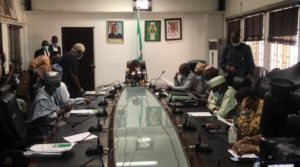The meeting was expected to lead to the call off of the strike but apparently ended without meeting that objective.
The federal government and the Academic Staff Union of Universities (ASUU) on Thursday declined to disclose the outcome of their meeting over the nine-month long strike by Nigerian university teachers.
The meeting was expected to lead to the call off of the strike but apparently ended without meeting that objective.
The closed-door meeting, held at the conference hall of the Ministry of Labour and Employment, was scheduled to begin at 4 p.m. but began at 5:20 p.m. and lasted until 8:18 p.m., with representatives of the parties refusing to brief the waiting journalists on its outcome.
Before the meeting started, the Minister of Labour and Employment, Chris Ngige, said the late start was owing to consultations that were still ongoing by Thursday morning at the Ministry of Finance.
“We on the government side went to consult our stakeholders, and the consultations were still on till this morning. We are starting late because the consultations were on up till this morning at the Federal Ministry of Finance,” he said.
Mr Ngige also said he was optimistic about the meeting.
Also speaking, the President of ASUU, Biodun Ogunyemi, said he shared the minister’s optimism.
“As soon as the situation is conducive enough, our members are willing and ready to resume work,” he said.
He said he hoped that the government would come up with something favourable to report back to the union members.
PREMIUM TIMES reported how the last meeting, which held in November, ended with the government making new proposals to the union which ASUU said it was immediately taking to its members for consideration.
Speaking with journalists after that meeting, Mr Ngige said the two parties had agreed on the core issues at the heart of their prolonged dispute.
These include funding for the revitalisation of universities, earned allowances, the shortfall in salaries, visitation panels for universities, and the use of the University Transparency and Accountability Solution (UTAS).
“In our last meeting, we agreed on so many things. Today we have discussed the issues again. As you know, there are about eight issues. We have done justice to all these and ASUU is supposed to take our conclusions to their organs. I do hope as a conciliator that there is a light at the end of the tunnel as I do hope ASUU will come back to us,” Mr. Ngige had said.
Before the aforementioned meeting, PREMIUM TIMES reported how the federal government offered N65 billion to the universities to address some of the lecturers’ demands.
Giving a breakdown of the N65 billion after a meeting between both parties, Mr Ngige said the Accountant-General of the Federation had offered to release N40 billion “or in the alternative, N35 billion to be shared by all the registered trade unions in the universities after providing necessary evidence of having earned the allowance.
“The 65 billion was proposed to be shared in two different manners. First, a proposal for N25 billion Revitalisation and N40 billion earned allowances for all the unions in the universities while the second proposal was “the issue of revitalisation getting N30 billion and earned allowances getting N35 billion.
“So the offer has been made, it is in this document, and ASUU is supposed to come back to the government with acceptance on either or one of the offers”.
The government also agreed to pay the lecturers their outstanding salaries using an older payment platform, GIFMIS, different from the controversial IPPIS.
Speaking on the constitution of visitation panels for public universities, Mr. Ngige said the panels would be inaugurated in the incoming week and would conclude their assignments on December 31.
